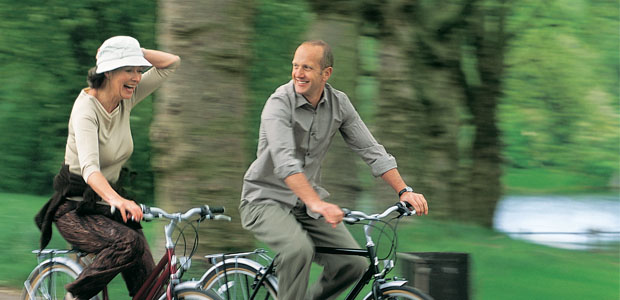Advertisement
Three Steps for Lifelong Health
They say there are only two certainties in life: death and taxes. You’ll notice that aging is not one of these. Simple changes in activity and non-prescription supplementation can have profound physical and mental effects, resulting in enormous improvement to health and well-being. Here are three important considerations for us to consider as we move … Continued

They say there are only two certainties in life: death and taxes.
You’ll notice that aging is not one of these.
Simple changes in activity and non-prescription supplementation can have profound physical and mental effects, resulting in enormous improvement to health and well-being. Here are three important considerations for us to consider as we move into our golden years.
The first step is to stand up, look in the mirror and say: “My legs are made for walking!”
A little bit of regular exercise has a myriad of long-term benefits. I know–if you’ve heard it once you’ve heard it a thousand times. But that’s because it’s true! Inactivity is a breeding ground for physical and mental disorder. Nevertheless, as you age an exercise regimen should be modified to suit your years and body type.
A recent study showed, for example, that in older persons strenuous exercise can have a negative effect on the immune system. The same study showed that habitual physical activity enhances immune function. Moderate habitual activity, without strain, should be a part of everybody’s daily routine. It may be worthwhile to also consider the addition of supplements, which can benefit your exercise routines and ease fatigue.
Creatine, a supplement that has been targeted toward endurance athletes and bodybuilders, could be more beneficial to an older person than a young one. (Creatine is a combination of three amino acids which can be made in our bodies but is also taken as a supplement. Its primary uses are to provide additional energy for our muscles, increase muscle volume and enhance protein synthesis.)
A recent comparative study of creatine use in younger and older men and women showed greater benefit to the older individuals. Creatine also increased the rate to exhaustion (in other words it could help you exercise longer without feeling fatigue).
Vitality in Vitamins
The second most important consideration is diet. Many older people eat less often or have smaller portions at mealtimes. It may be sound to reduce caloric intake as we age but it is not sensible to reduce essential vitamins and minerals. The malabsorption of essential vitamins such as B12 can occur from bacterial overgrowth, which results in fatigue or excessive prescription drug use and may be a common problem in older persons. Many older individuals consume insufficient vitamin C, B6 and minerals such as niacin, phosphorous and magnesium. Doctors with a focus on complementary medicine generally recommend a higher intake of supplements for those over 50. This might include a quality, bio-available multi, supplemented with additional vitamin C at about two grams per day, along with 800 IUs of mixed-tocopherols vitamin E, 25,000 IUs of beta-carotene and 200 mcgs of selenium for its antioxidant powers.
Regardless of age, very few people understand the correlation between mental attitude and vitamin intake. The link between omega-3 fatty acids and “heart health” has received a lot of attention. Just as relevant is that deficiencies of omega-3 fatty acids can result in depression.
Reduced physical activity and/or a high intake of prescription drugs can impair the intake of vitamins and minerals that help us all maintain a healthy physical frame. In fact, studies show that by age 80 there is a reduced nutrient intake of up to 30 percent. Understanding the need for supplementation is accepted by many people–but addressing that need according to one’s age is equally important.
The third component to healthy aging is nutritional supplementation with vitamins, minerals and essential fatty acids–the “good fats.” Many common “age-related” conditions are treated with strong drugs and sometimes surgery. However, with an enormous public interest in drug alternatives, a great many studies have been conducted showing that there are better non-drug alternatives to prescription medicines. Long-term oral supplementation of zinc sulfate at 100 mg twice daily (81 mg elemental zinc) has been shown in double-blind placebo-controlled trials to limit visual loss in those with macular degeneration. Ginkgo biloba, usually hailed for its prowess in alleviating memory loss, has been shown to prevent oxidative stress in liver and brain mitochondria (site of the cell’s energy production) associated with aging. Black cohosh, often taken to lighten premenstrual discomfort, was used in eight German clinical trials to alleviate menopausal symptoms; about 8 mg per day will have a significant health benefit. These are just a few of the clinically proven drug alternatives available without a prescription.
While nearly one-third of older persons in North America use some form of alternative medicine, they are much more likely to use herbs and prescription medicine together.
Responsibility for a healthy golden age rests on your shoulders: No one can force you to exercise, eat right or seek out informed medical advice. Remember–it’s your life and your health.




